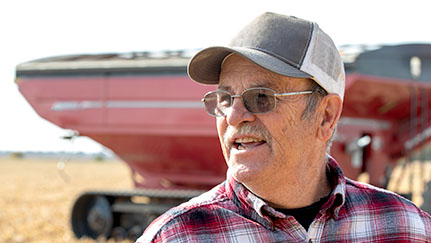Farmers embody independence, resilience and strength. However, in the face of a mental health crisis, these very attributes can lead to devastating outcomes. A farmer might appear fine on the surface yet be struggling with profound internal turmoil. And discussing a farmer's mental well-being is often met with difficulty.
Farmers are 3.5 times more likely to die by suicide than the general population, according to the National Rural Health Association. We must learn to recognize the signs of distress and be prepared to help. Also, if you're the one who needs support, remember it's totally okay to ask for help.
Factors impacting mental health in agriculture
Farmers are three and a half times more likely to die by suicide than the general population, according to the National Rural Health Association. There are a range of specific factors that contribute to the trend of farmer suicide, including:
- Social isolation
- Advanced age
- Chronic medical conditions
- Farm financial stressors
- Long hours and fatigue
- Weather
“Farmers and ranchers in the U.S. have demanding jobs that are often compounded by economic uncertainty, vulnerability to weather events and isolation,” according to a report from the Rural Health Information Hub. “Rural agricultural communities may also have limited access to healthcare and mental health services, which can make it difficult for farm and ranch families to receive support when they are experiencing extreme stress, anxiety, depression or another mental health crisis.”
Overcoming mental health stigmas
The stigma around mental health, especially within the farming community, often equates weakness, preventing many farmers with depression from seeking help. It's vital to overcome this stigma to create a supportive environment where mental health can be openly addressed without fear.
“Farming can be a solitary job in which people can feel stress and isolation that contribute to anxiety and in the long term, mental health issues,” said NY Farm Net Outreach Director Adam Howell. “The stigma of mental health care in agriculture is major, and overcoming that stigma requires us working together and attention to ways to overcome the anxiety and depression that is common among farmers.”
Coping and communication tactics
In communicating with a farmer or rancher who you feel could be near his or her “breaking point,” start with the following steps:
- Listen. Often, the best path to a life-saving resolution starts with listening intently and showing you’re doing so. The most effective communication is a two-way street in which listening always precedes responding.
- Ask questions. This is not only a way to show you’re listening, but it also helps someone experiencing severe anxiety to open up and become more engaged in a conversation that can yield positive results.
- Don’t jump to conclusions. Always keep an open mind when starting a farmer mental health conversation. Also, recognize it’s rarely a simple, “black and white” conversation.
- Encourage self-care. Farmers can sometimes be their own toughest critics. When a mental health crisis is underway, that can be severely damaging. Encourage them to instead care for themselves.
- Avoid compassion fatigue. Don’t neglect your own feelings in supporting others. Make sure you account for your own mental health as you provide attention and energy to others.
Mental health resources
Are you dealing with anxiety or depression? Are you concerned for the life of a loved one or friend who may be depressed? Call or text 988 or chat here.
